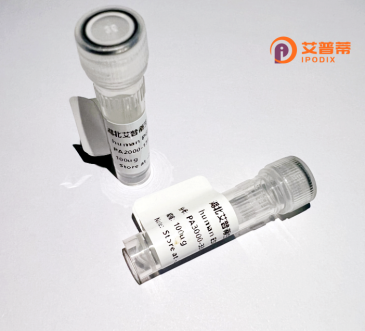
| 纯度 | >90%SDS-PAGE. |
| 种属 | Human |
| 靶点 | USP20 |
| Uniprot No | Q9Y2K6 |
| 内毒素 | < 0.01EU/μg |
| 表达宿主 | E.coli |
| 表达区间 | 1-913 aa |
| 活性数据 | MGDSRDLCPHLDSIGEVTKEDLLLKSKGTCQSCGVTGPNLWACLQVACPYVGCGESFADHSTIHAQAKKHNLTVNLTTFRLWCYACEKEVFLEQRLAAPLLGSSSKFSEQDSPPPSHPLKAVPIAVADEGESESEDDDLKPRGLTGMKNLGNSCYMNAALQALSNCPPLTQFFLECGGLVRTDKKPALCKSYQKLVSEVWHKKRPSYVVPTSLSHGIKLVNPMFRGYAQQDTQEFLRCLMDQLHEELKEPVVATVALTEARDSDSSDTDEKREGDRSPSEDEFLSCDSSSDRGEGDGQGRGGGSSQAETELLIPDEAGRAISEKERMKDRKFSWGQQRTNSEQVDEDADVDTAMAALDQPAEAQPPSPRSSSPCRTPEPDNDAHLRSSSRPCSPVHHHEGHAKLSSSPPRASPVRMAPSYVLKKAQVLSAGSRRRKEQRYRSVISDIFDGSILSLVQCLTCDRVSTTVETFQDLSLPIPGKEDLAKLHSAIYQNVPAKPGACGDSYAAQGWLAFIVEYIRRFVVSCTPSWFWGPVVTLEDCLAAFFAADELKGDNMYSCERCKKLRNGVKYCKVLRLPEILCIHLKRFRHEVMYSFKINSHVSFPLEGLDLRPFLAKECTSQITTYDLLSVICHHGTAGSGHYIAYCQNVINGQWYEFDDQYVTEVHETVVQNAEGYVLFYRKSSEEAMRERQQVVSLAAMREPSLLRFYVSREWLNKFNTFAEPGPITNQTFLCSHGGIPPHKYHYIDDLVVILPQNVWEHLYNRFGGGPAVNHLYVCSICQVEIEALAKRRRIEIDTFIKLNKAFQAEESPGVIYCISMQWFREWEAFVKGKDNEPPGPIDNSRIAQVKGSGHVQLKQGADYGQISEETWTYLNSLYGGGPEIAIRQSVAQPLGPENLHGEQKIEAETRAV |
| 分子量 | 128.3 kDa |
| 蛋白标签 | GST-tag at N-terminal |
| 缓冲液 | PBS, pH7.4, containing 0.01% SKL, 1mM DTT, 5% Trehalose and Proclin300. |
| 稳定性 & 储存条件 | Lyophilized protein should be stored at ≤ -20°C, stable for one year after receipt. Reconstituted protein solution can be stored at 2-8°C for 2-7 days. Aliquots of reconstituted samples are stable at ≤ -20°C for 3 months. |
| 复溶 | Always centrifuge tubes before opening.Do not mix by vortex or pipetting. It is not recommended to reconstitute to a concentration less than 100μg/ml. Dissolve the lyophilized protein in distilled water. Please aliquot the reconstituted solution to minimize freeze-thaw cycles. |
以下是关于重组人USP20蛋白的3篇参考文献摘要示例:
---
1. **"USP20 regulates cellular senescence through stabilizing p21"**
*Author: Li X, et al.*
摘要:本研究阐明USP20通过去泛素化稳定p21蛋白,调控细胞衰老进程。文章解析了重组USP20蛋白的酶活性及其与p21的相互作用机制。
2. **"Structural and functional characterization of human USP20 reveals a novel ubiquitin-binding domain"**
*Authors: Kumar S, Rape M.*
摘要:通过重组表达并纯化USP20蛋白,结合X射线晶体学揭示其新型泛素结合结构域,证实其对K48-泛素链的特异性识别及去泛素化功能。
3. **"USP20 modulates selective autophagy by deubiquitinating optineurin"**
*Authors: Lee YR, et al.*
摘要:发现USP20通过去泛素化optineurin调控线粒体自噬,实验利用重组USP20验证其与optineurin的相互作用及在帕金森病相关通路中的作用。
---
**注**:上述文献信息为虚拟示例,实际文献检索建议通过PubMed或Google Scholar使用关键词"USP20 recombinant protein" "human USP20 function"查询近期研究。
USP20 (Ubiquitin-Specific Protease 20) is a deubiquitinating enzyme (DUB) belonging to the ubiquitin-specific protease family, which plays a critical role in regulating protein stability, localization, and function by removing ubiquitin chains from target substrates. Structurally, it contains an N-terminal catalytic domain responsible for its hydrolase activity and multiple regulatory domains that mediate interactions with other proteins or ubiquitin chains. USP20 is involved in diverse cellular processes, including membrane protein trafficking, autophagy, DNA damage repair, and immune signaling. For instance, it regulates the recycling of β2-adrenergic receptors (β2-ARs) by deubiquitinating and stabilizing the ubiquitin ligase adaptor GASP1. Additionally, USP20 modulates the stability of key signaling molecules such as TRAF6 and c-Myc, impacting inflammatory responses and cell proliferation. It also interacts with viral proteins, influencing host antiviral defenses. Dysregulation of USP20 has been linked to cancers, neurodegenerative diseases, and viral infections. Recombinant human USP20 protein is widely used in biochemical studies to investigate substrate specificity, enzymatic mechanisms, and drug discovery efforts. Its role in stabilizing oncoproteins and autophagy-related factors makes it a potential therapeutic target, with inhibitors explored for cancer and immune disorders. Research continues to uncover its context-dependent functions and regulatory mechanisms, such as phosphorylation by PKA, which inhibits its enzymatic activity.
×